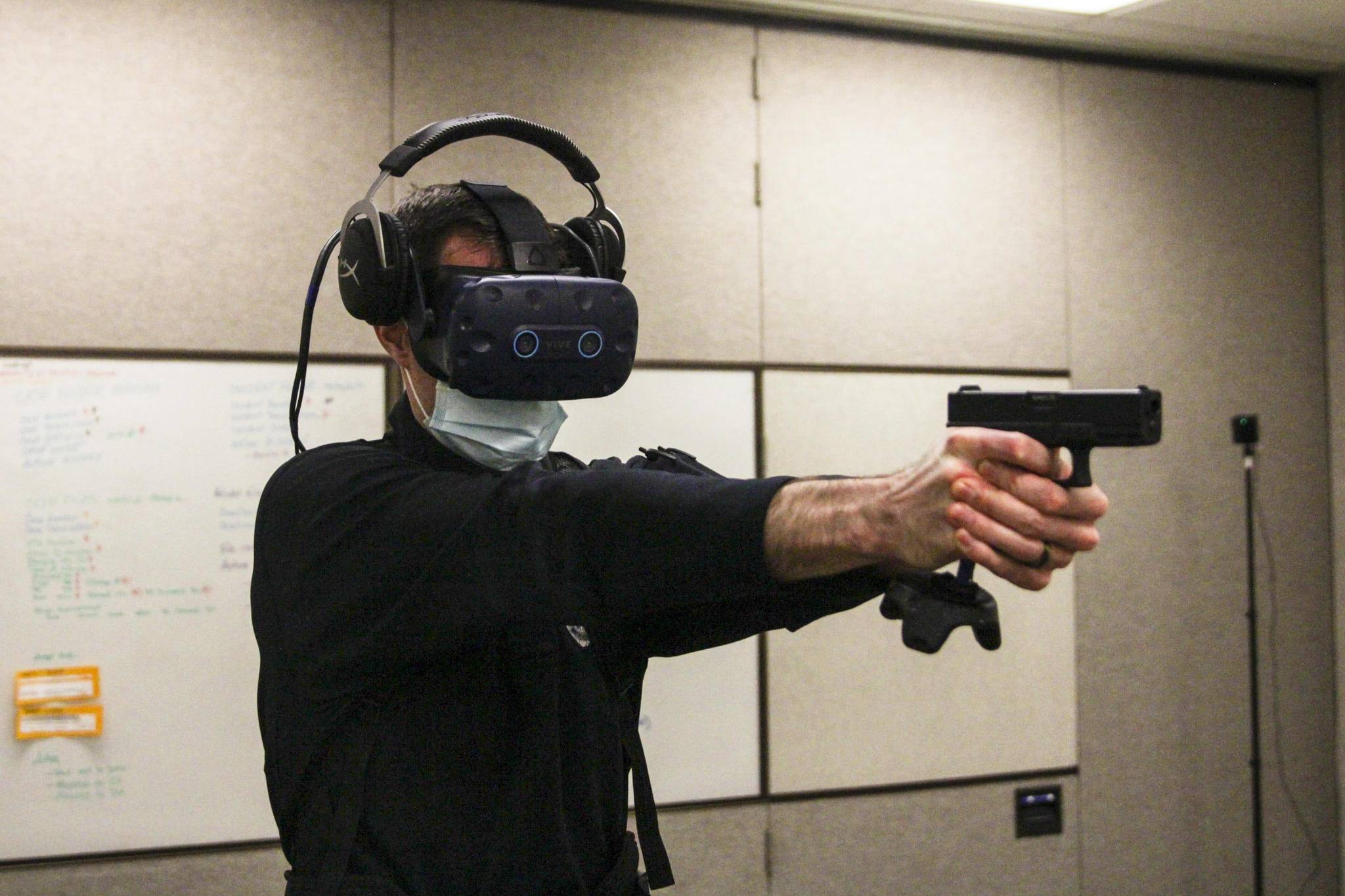Training is invaluable in any profession, especially for police, training for something as fraught and essential as de-escalation.
So what do you do when you can’t bring in trainers or even get close to each other?
If you’re the Juneau Police Department, you go virtual. JPD recently adopted a virtual reality-based training program allowing officers to practice de-escalation without the need for additional personnel and making it the largest part of a recent annual training block.
“It goes without saying that one of the biggest topics in the police world is training and de-escalation, and how we’re able to provide better service in those situations where there are difficult circumstances where someone has mental illness or addiction,” said Chief Ed Mercer in an interview.
The Apex Officer is a VR training simulator for de-escalation training and other types of training made by a company of the same name in Las Vegas, said Sgt. Sterling Salisbury, who, along with Detective Patrick Taylor, researched and acquired the trainer.
[Juneau police begin program for at-risk community members]
“We had received a grant, so I started looking for some de-escalation training,” Salisbury said. “With COVID, there was nowhere we really could go.”
The hardware consists of a worn backpack with the computer for generating virtual space, a headset and headphones connected to the backpack for audio and visual, and handheld controllers to represent the officer’s sidearm, a longarm or other tools police might use, such as pepper spray or a flashlight. There are two full kits, so officers can simulate situations with their partners during training.
“De-escalation is putting yourself in their shoes and understanding what they’re going through at the time,” Taylor said. “We deal with this day in and day out and it can be hard not taking it personally.”
How it works
All movement of the officer and the controllers are tracked by four sensors on tripods that enclose the virtual space that the officer can move around in. A laptop in a separate room allows the officer running the training to move virtual people around in the simulation, controlling their actions and speaking through them — both driving and responding to the actions of the officers in the simulation.
“It’s another way to put officers through a variety of scenarios from high intensity to low level to react to the scenarios in a way we want them to,” said Lt. Krag Campbell. “It’s not always shoot/don’t shoot training. Sometimes it’s helping an old lady to cross a street. It’s a tool that allows us to quickly and efficiently do that with manpower and staffing concerns.”
A variety of scenarios and subjects can be simulated, from a man in a traffic stop in a quiet neighborhood to a suicidal woman with a handgun in a soccer field in a city. The officers running the scenario control their actions and act as both the voice actor and operator for the subject and as dispatch.
“Typically, we have one person operating the computer and the other person is watching the people training,” Salisbury said. “If I have two officers in the simulation, I can switch my view to see what each officer is seeing or the overall view.”
Officers went through a 6-7 hour classroom portion on types of behaviors and de-escalation strategy before spending time in VR, Salisbury said.
“The overarching goal is to understand that we as humans all communicate differently,” Salisbury said. “There’s conflict in everyday life with everyone, your boss, your coworkers, everyday citizens on the street.”
Officers have limited ability to traverse the VR world within the bounds of the real-world room they’re in, including going up virtual stairs in some scenarios. Some officers participating in the training had some initial disorientation from the VR, Salisbury said, recounting a time where he’d been so immersed that he’d lifted his foot to step onto a curb that didn’t really exist and tripped a little bit.
Expanding the toolbox
While not the final word in training, the program and hardware do open options, Taylor said.
“The hope is to get to more in-person stuff. But also to incorporate this as another tool,” Taylor said. “Getting training over Zoom is OK, but it’s much better to get someone to come here or send guys somewhere.”
It could also be a training tool or a demonstration tool for other situations, Salisbury said. There was a potential to use the hardware and software for training crisis negotiators or special tactics personnel, Taylor said. It could also be used to demonstrate potential scenarios to other stakeholder groups, to help everyone build a strong community, Taylor said.
“There’s a lot of potential with it. You could put our dispatchers through it. You could put our community partners through it,” Taylor said. “It’s good for transparency.”
De-escalation is a core piece of everyday policing, Mercer said, and any tool that can improve JPD’s performance there is a useful one.
“It’s how we treat people that’s essential. You have to treat people with compassion and respect. You’re catching some people on their worst day,” Mercer said. “We’re always thinking about these things to improve the agency.”
• Contact reporter Michael S. Lockett at (757) 621-1197 or mlockett@juneauempire.com.

